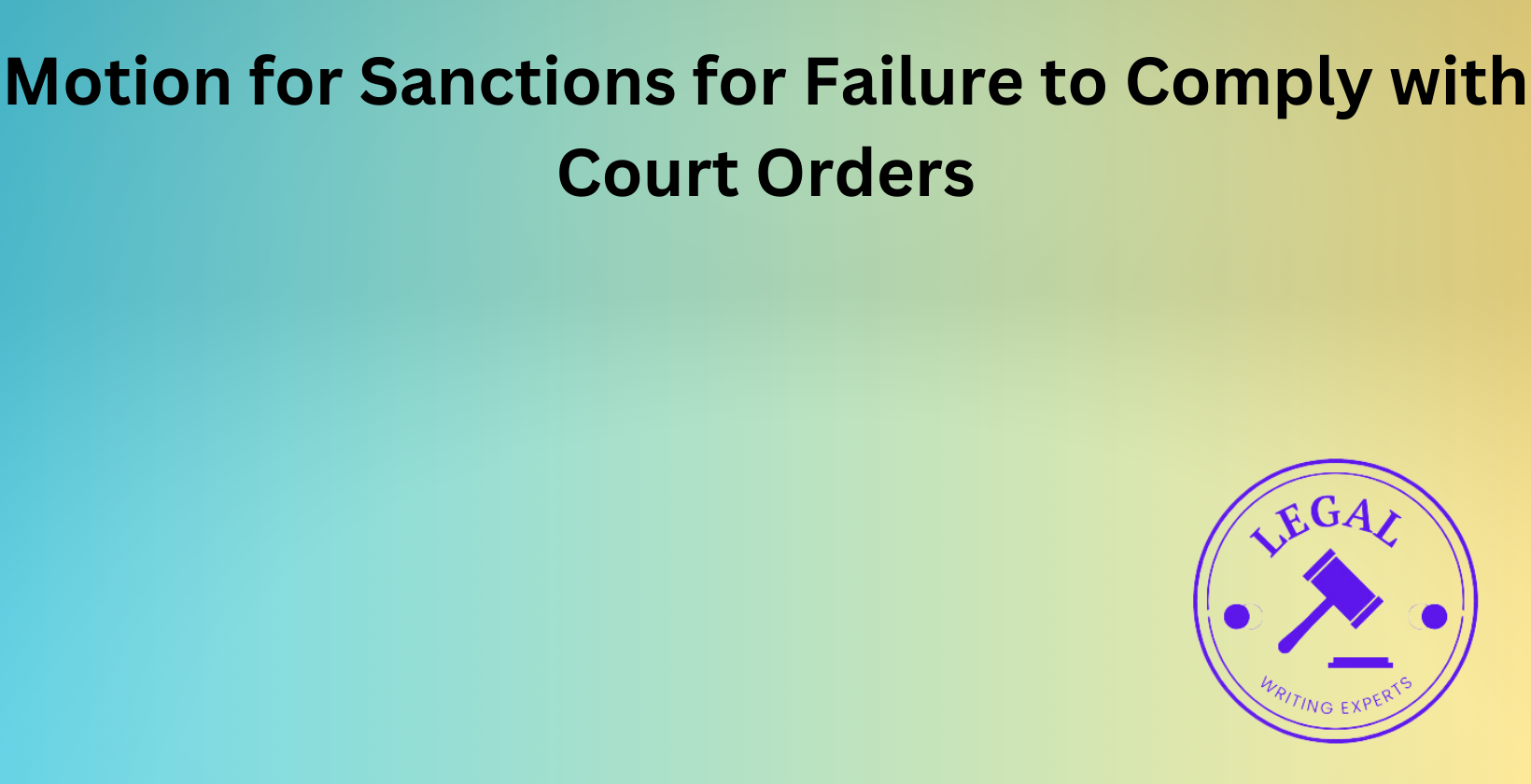Motion for Sanctions for Failure to Comply with Court Orders
Written by
Jessica E
February 06, 2025 · 8 min read

A motion for sanctions for failure to comply with court orders is a legal request asking a court to impose penalties on a party that has not followed a judicial directive. This legal tool ensures compliance with court rulings and maintains the integrity of judicial proceedings. Courts impose sanctions to discourage misconduct and protect the legal rights of the opposing party. Understanding how to draft, file, and defend against such motions is essential for legal practitioners and individuals involved in litigation.
What Is a Motion for Sanctions for Failure to Comply with Court Orders?
A motion for sanctions for failure to comply with court orders is a formal request submitted to a court, asking for penalties against a party that has disregarded a judicial directive. This motion is typically filed when a party refuses to provide discovery, fails to adhere to procedural requirements, or disobeys court-imposed deadlines. The objective is to compel compliance and, in some cases, seek punitive measures against the non-compliant party.
How to Write a Motion for Sanctions for Failure to Comply with Court Orders?
To write a motion for sanctions for failure to comply with court orders, one must include a clear and detailed explanation of the non-compliance. The motion should contain the case caption, a statement of facts outlining the court order and the failure to comply, legal arguments citing applicable rules, and a request for relief specifying the desired sanctions. Supporting evidence, such as court transcripts or correspondence, strengthens the motion. A law essay writing service can assist in drafting a precise and persuasive motion.
Where to Hire a Legal Writer to Draft a Motion for Sanctions for Failure to Comply with Court Orders?
A legal writer to draft a motion for sanctions for failure to comply with court orders can be hired through a law essay writing service, legal writing services, or freelance legal writers from reputable platforms likeLegal Writing Experts. These professionals ensure the motion is well-structured, adheres to legal standards, and effectively argues for sanctions.
How to File a Motion for Sanctions for Failure to Comply with Court Orders?
To file a motion for sanctions for failure to comply with court orders, the moving party must submit the motion to the appropriate court, serve a copy to the opposing party, and follow the local court rules. The court may schedule a hearing to review the motion, during which both parties present arguments. The moving party must demonstrate non-compliance and justify the need for sanctions.
What Are the Legal Grounds for Filing a Motion for Sanctions?
The legal grounds for filing a motion for sanctions include willful disobedience of court orders, failure to respond to discovery requests, refusal to comply with procedural rules, and intentional delay tactics. Courts require clear evidence of non-compliance before imposing sanctions. A law assignment help service can assist in identifying relevant legal grounds and citing applicable laws.
What Are the Potential Consequences of Failing to Comply with Court Orders?
The potential consequences of failing to comply with court orders include monetary fines, dismissal of claims, default judgments, evidence exclusion, and, in extreme cases, contempt of court leading to imprisonment. Courts impose sanctions proportionate to the severity of non-compliance to uphold legal standards.
How Does Rule 37 of the Federal Rules of Civil Procedure Apply to Sanctions?
Rule 37 of the Federal Rules of Civil Procedure applies to sanctions by providing courts with authority to penalize parties that fail to comply with discovery obligations. This rule outlines various sanctions, including striking pleadings, issuing default judgments, or requiring the non-compliant party to cover legal fees. A legal writing service can provide detailed analysis and arguments based on Rule 37 when filing a motion for sanctions.
What Are the Different Types of Sanctions Imposed for Non-Compliance?
The different types of sanctions imposed for non-compliance include monetary sanctions, issue-related sanctions (such as prohibiting the introduction of certain evidence), case-dispositive sanctions (dismissal or default judgment), and contempt sanctions, which may involve fines or imprisonment. Courts select the appropriate sanction based on the severity of the violation.
How Can One Prove Non-Compliance with Court Orders in a Motion for Sanctions?
To prove non-compliance with court orders in a motion for sanctions, the moving party must provide documentary evidence, court transcripts, witness statements, and prior correspondence showing the opposing party’s refusal to adhere to the court order. A legal essay writer can help compile the necessary documentation and draft persuasive arguments.
What Are the Steps Involved in the Motion for Sanctions Process?
The steps involved in the motion for sanctions process include identifying the violation, gathering supporting evidence, drafting the motion with legal arguments, filing the motion with the court, serving the motion to the opposing party, and attending a hearing where both parties present arguments. Courts then issue a ruling based on the merits of the motion.
How Do Courts Determine Appropriate Sanctions for Non-Compliance?
Courts determine appropriate sanctions for non-compliance by considering the nature of the violation, the extent of harm caused to the opposing party, whether the non-compliance was intentional, and whether lesser sanctions would achieve compliance. Legal precedent and procedural rules guide the court’s decision-making process.
What Are Common Defenses Against a Motion for Sanctions for Failure to Comply?
Common defenses against a motion for sanctions for failure to comply include proving that the non-compliance was due to unforeseen circumstances, demonstrating substantial compliance, arguing that the requesting party acted in bad faith, or challenging the validity of the underlying court order. A law assignment writing service can assist in developing strong defenses tailored to specific cases.


